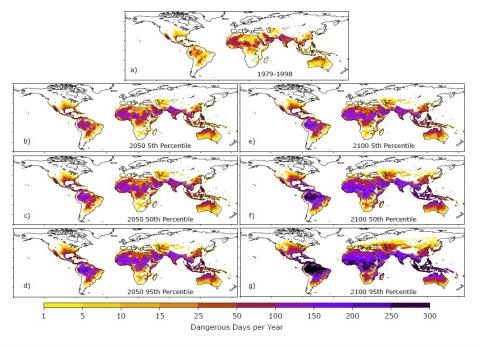Reactions: global temperature sets new heat record for the last 12 months
An attribution study by Climate Central concludes that from November 2022 to October 2023, global temperatures will set a new record, exceeding pre-industrial levels by more than 1.3°C above pre-industrial levels. This would be the warmest 12-month period on record to date. The analysis shows that during this period, 5.7 billion people were exposed to at least 30 days of above-average temperatures, including most of the Spanish population.

José Miguel Viñas - 12 meses calor EN
José Miguel Viñas
Meteorologist at Meteored at www.tiempo.com and consultant for the WMO (Spain)
Is the study of good quality?
"Yes, it is endorsed by Climate Central, which is an organisation that started in 2008, in which climate researchers and science communicators collaborate, and whose main objective is to disseminate climate change data and studies in an accessible and attractive way. The methodology used in this report is rigorous. It uses a standardised index of attribution of observed temperatures across the Earth over the last twelve months.
The study certifies what we have seen here in Spain and in many other regions of the world. The average temperature of the planet has jumped in 2023, which cannot be attributed to a single cause, but bears the signature of anthropogenic global warming. It is worth noting that the influence of the El Niño event that began in late spring is still small in the observed temperature rise. It will be towards 2024 when it will contribute more heat to the air, which will have a greater impact on the temperature rise".
What are its limitations?
"Methodologically it is correct. It would be a rounded study if, apart from documenting the hundreds of extreme heat spikes that have occurred over continental areas and certifying their attribution to climate change, it also included the extreme ocean surface temperature data and identified which factors and to what extent each of them can explain the concatenation of extraordinary warm anomalies and the frequency of extreme heat events. This is beyond the scope of this study".
Anna Cabré - 12 meses de calor EN
Anna Cabré
Climate physicist, oceanographer and research consultant at the University of Pennsylvania
The Climate Central study confirms again (as in other studies) that we are experiencing the hottest year in recent history. It also conducts an attribution study to determine what contribution climate change and El Niño have made to warming and puts into perspective what this means for our health, economy, etc. In addition, it gives innovative tools and metrics to better understand how warming affects different regions, which is useful for high-level decision making.
From my perspective, there is still no consensus on whether or not warming is definitely accelerating. In any case, such high temperatures should be understood as an urgency, as a warning that decarbonisation needs to go even faster and that adaptation funding, especially in vulnerable countries, needs to grow exponentially.
Ernesto Rodríguez Camino - 12 meses calor EN
Ernesto Rodríguez Camino
Senior State Meteorologist and president of Spanish Meteorological Association
Climate Central is a non-profit organisation based in Princeton (New Jersey, USA) that focuses primarily on the communication and dissemination of information related to climate change, providing tools and results for dissemination in the media. Its multidisciplinary team includes both scientists and communicators who strive to extract the most relevant information on climate change and its effects in order to communicate them effectively and reach a wide audience. In the case of this study, it concludes that the period from November 2022 to October 2023 is the warmest 12-month period since records have been kept, which in turn is consistent, as has been widely reported, with the monthly global temperature records that have been reached in recent months coinciding with a transition to the positive phase of the El Niño-Southern Oscillation.
The most interesting aspect of the study is the use of the recently published Climate Change Index (CSI) which measures the extent to which climate change has influenced daily average temperatures in a particular region. The CSI is calculated on a day-by-day basis and allows real-time determination of how climate change has changed the probability of a daily temperature anywhere in the world. From this data, the regions, countries and cities that have experienced the highest values of the index in this 12-month period are determined. It is worth mentioning that Spain is the country in Europe with the highest CSI value and therefore the one that has been most influenced by climate change on its average temperatures.
The results of this work, together with the tool that calculates the CSI index in real time on a daily basis and which is hosted on the Climate Central website, provide an immediate response to the role of anthropogenic climate change in the appearance of extreme temperatures anywhere in the world. However, it is primarily a tool and results designed to present attribution results and their immediate communication, rather than looking at special episodes on a case-by-case basis by performing case-specific simulations.
Climate Central
- Report



